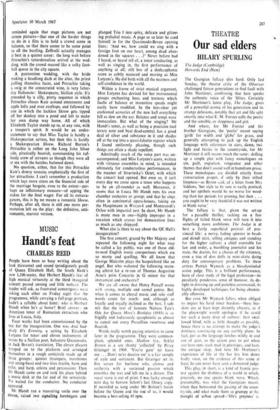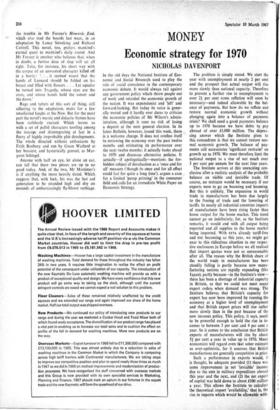THEATRE
Our sad elders
HILARY SIT RUNG
The Georgian fallacy dies hard. Only last Sunday, the theatre critic of the Observer challenged future generations to find fault with John Mortimer, confirming that here speaks the authentic voice of the 'fifties. Certainly Mr Mortimer's latest play, The Judge, gives off a powerful aroma of his generation and its strange delusions, notably that art and life split smartly into what E. M. Forster calls the poetic and the sensible, or sloppiness and grit.
And where, for Mr Forster and his brother Georgians, the 'poetic' meant saying 'girth' for width and 'glebe' for grass, and generally attempting to jack up the English language with references to stars, dawn, twi- light and fairies in the countryside, for Mr Mortimer it still means much the same: doling up a simple plot with fancy monologues on sin, guilt, expiation, vengeance and other themes that don't sound well in humdrum prose. These monologues are divided strictly from conversation proper, if only by their stilted limpness—as Byron said, of a letter from Mrs Siddons, 'her style to be sure is vastly poetical, and her epithets would be no worse for weed- ing than her periods for pruning, but then . . . you ought to be very thankful it was not written in blank verse.'
The fallacy is that, given the set-up for a passable thriller, tacking on a few flights of failed blank verse will turn it into something more ambitious. The Judge is at best a fairly superficial portrait of pro- vincial life: a nervy, fading spinster in beads and dirndl skirt, selling antiques and standing for the higher culture; a chief constable for law and order, a bumbling journalist and his mate, the doctor, for a chorus of the citizenry, even a trio of dim dolls in mini-skirts doing duty for contemporary problems. To these arrives Patrick Wymark as a bloodyminded assize judge. This is a brilliant performance, born of close study of the legal profession—its peculiarly ponderous sense of humour, its de- light in dressing up and pointless ceremonial, its highly developed techniques for being abomin- ably offensive.
But even Mr Wymark falters when obliged to impart his lurid inner burdens—these bur- dens are at least kept decently obscure, as if the playwright would apologise if he could for such a nasty dose of culture: best swal- lowed blind, with as little thought as possible, hence there is no attempt to make the judge's dottiness convincing on any earthly plane. In fact, just as the language lurches wildly in and out of gear, so the action goes to pot when our hero runs stark mad in pinstripes, and loots the antique shop. And here Mr Mortimer's experience of life at the bar lets him down badly since, on the evidence of this scene at least, he can never have seen a demented judge.
This play, in short, is a kind of frantic pro- test against the drabness of a world in which, precisely, no one speaks blank verse. Which, presumably, was what the Georgians meant, when they bemoaned the passing of the coun- tryside, and what made them so grumpy at the thought of urban spread—life's greyness' is
the trouble in Mr Forster's Howards ,End, which also trod the boards last week, in an adaptation by Lance Sieveking and Richard Cottrell. This novel, too, prefers mankind's eternal quest to mankind's daily round And Mr Forster is another who believes that, when in doubt, a furtive dose of slop will set all right. Take, for instance, his short way with the corpse of an unwanted character killed off in a hurry: '. . . it seemed wisest that the hands of Leonard should be folded on his breast and filled with flowers . . . Let squalor be turned into Tragedy, whose eyes are the stars, and whose hands hold the sunset and the dawn.'
Rags and tatters of this sort of thing, still adhering to the adaptation, make for a few unsolicited laughs at the New. But for the most part the novel's mystic and didactic themes have been ruthlessly excised. Which leaves us with a set of pallid characters tootling among the teacups and disintegrating at last in a flurry of highly improbable plot developments. The whole directed without enthusiasm by Frith Banbury and run by Gwen Watford at her bossiest, and hysterically genteel, as Mar- garet Schlegel.
Anyone with half an eye, let alone an ear, can tell that these two pieces are up to no good today. And, of the two, Mr Mortimer's is if anything the more heavily dated. Which suggests that, with luck, his was the last sad generation to be stranded high and dry on mounds of embarrassingly fly-blown verbiage.































 Previous page
Previous page